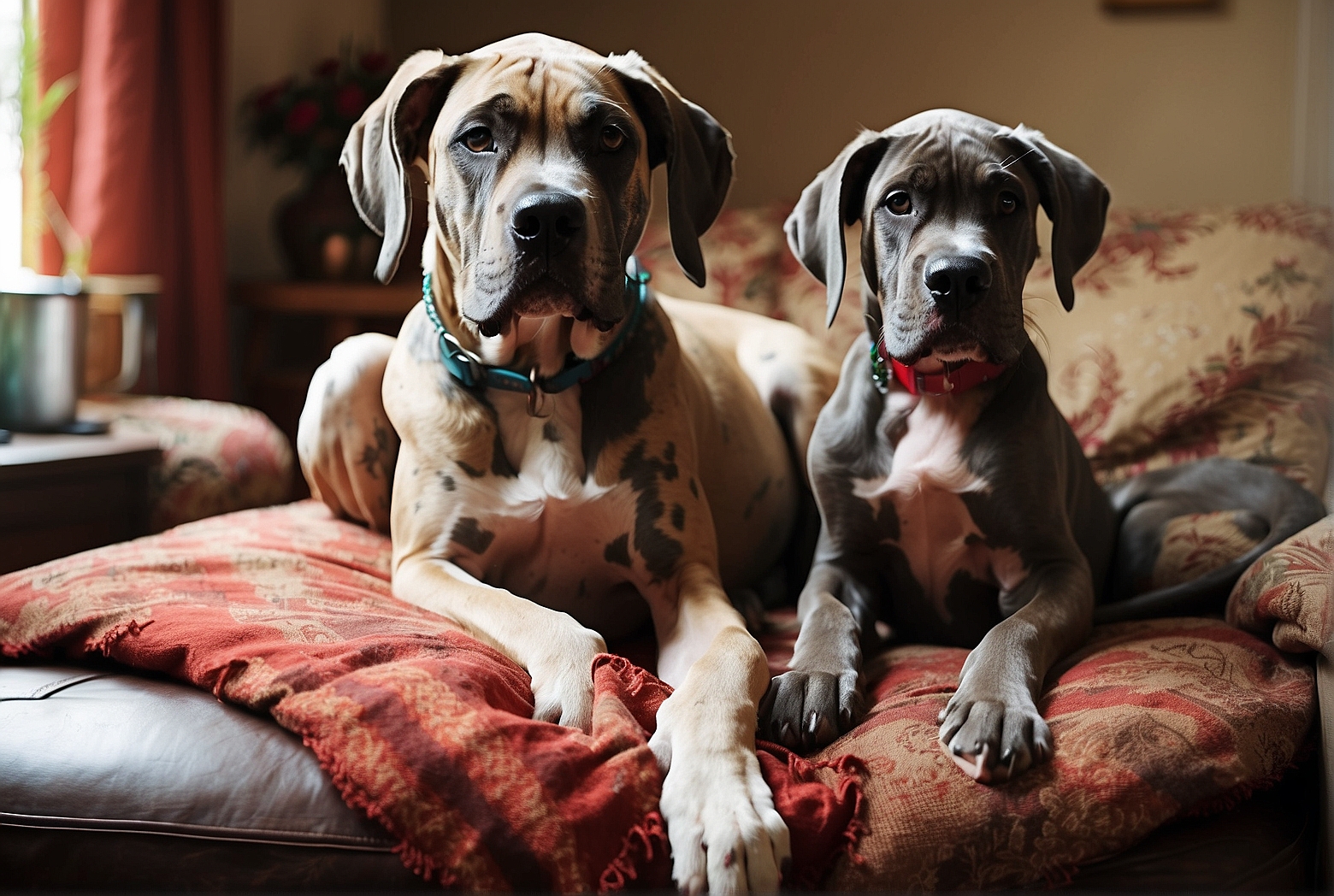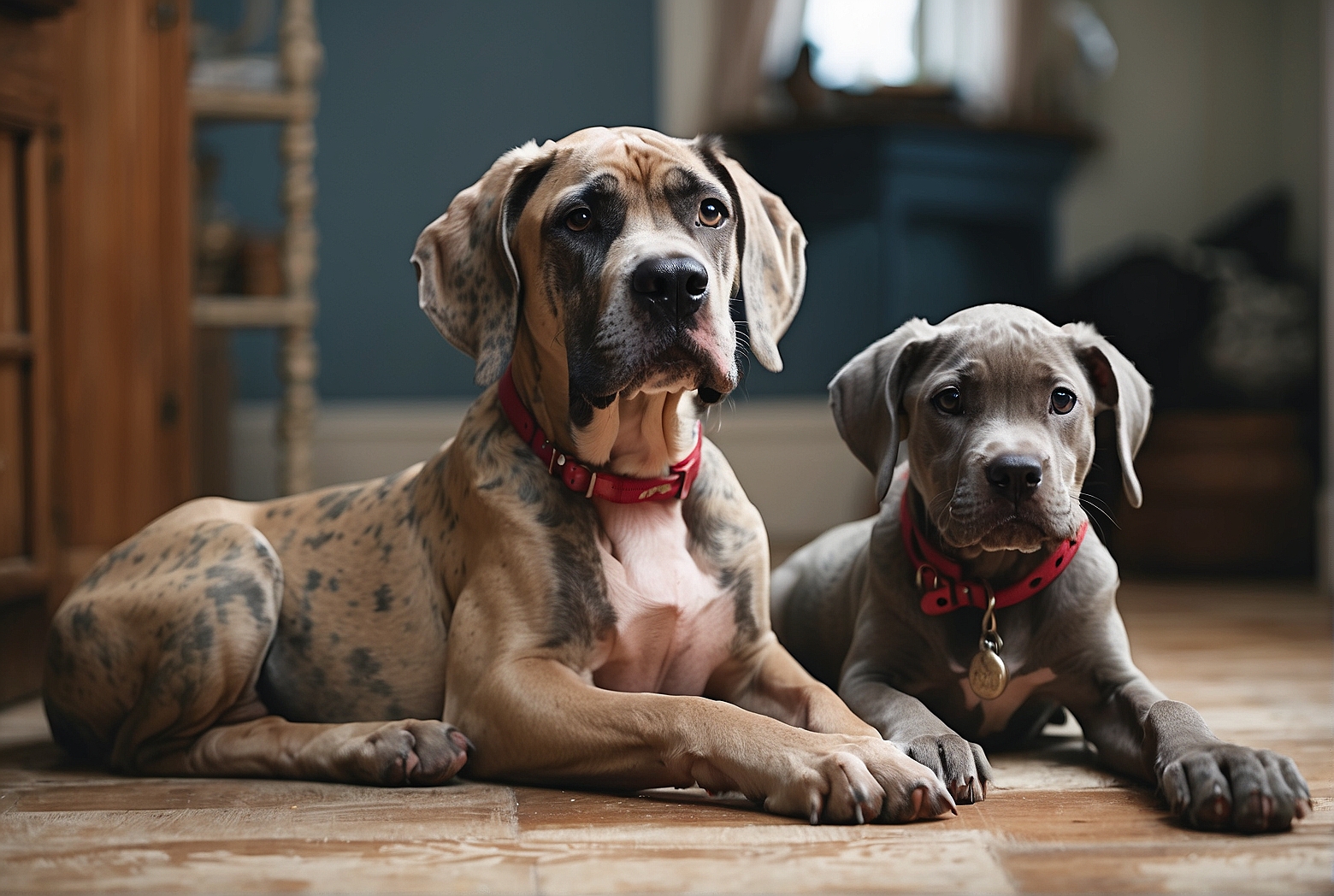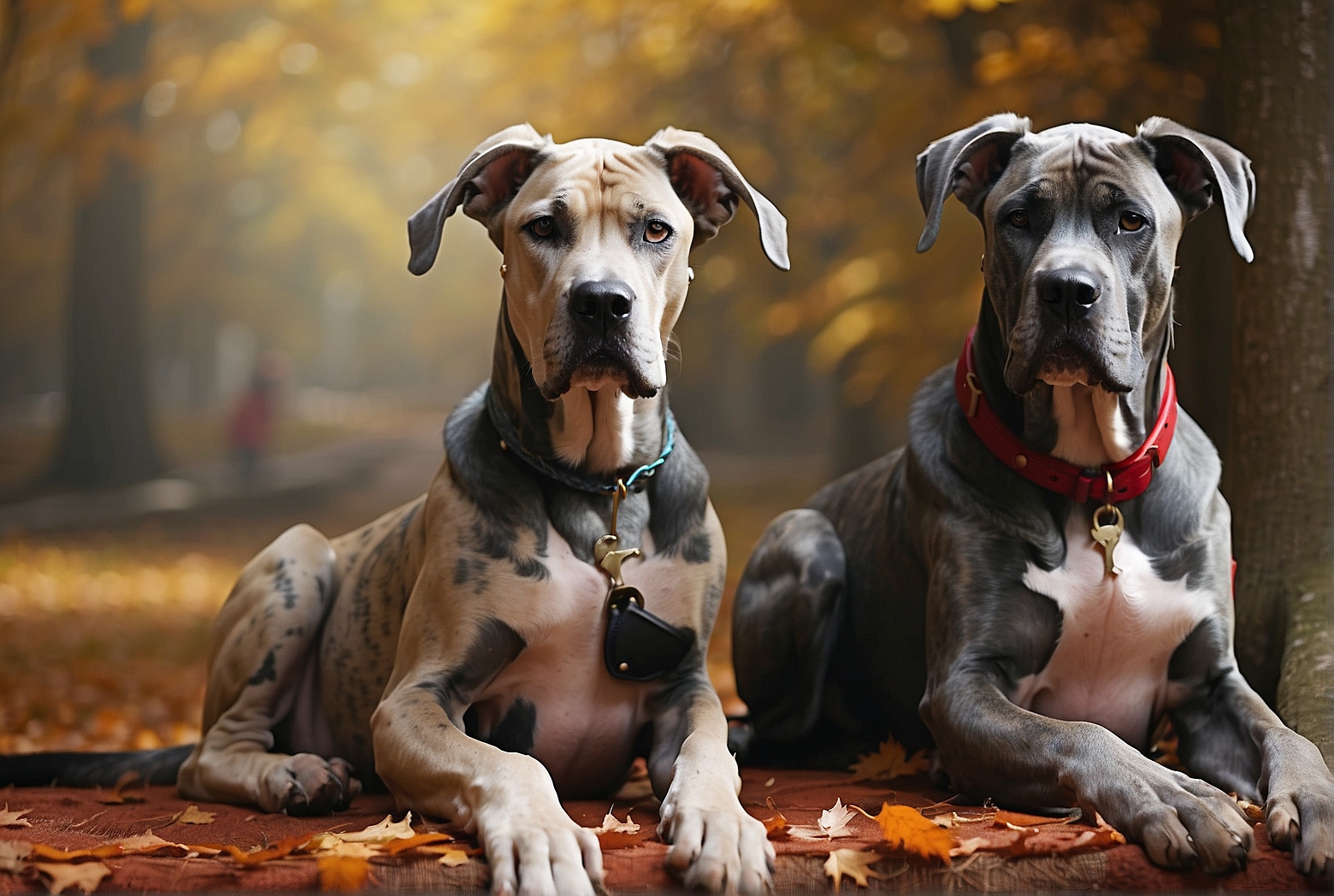Imagine having a gentle giant by your side, bounding with love and loyalty, creating unforgettable memories for the whole family. This is the essence of owning a Great Dane, a majestic breed that warms hearts with its affectionate nature. But before you welcome this magnificent creature into your home, consider its compatibility with family life. With its strong protective instincts and patient temperament, a Great Dane can indeed be an exceptional addition to any family, providing a treasure trove of cherished moments. In contrast to the lively and exuberant Pomeranian, the Great Dane’s calm demeanor makes it an enticing choice for households seeking tranquility and a deeper bond with their furry companion. So, let us delve into the fascinating world of the Great Dane and uncover why it may be the perfect family pet you’ve been searching for.
Characteristics of Great Danes
Size
Great Danes are known for their large size, standing tall and majestic. They are one of the largest dog breeds, often reaching heights of over 30 inches and weighing between 100 and 200 pounds. Their impressive size is part of their allure and makes them a recognizable breed.
Temperament
Despite their imposing size, Great Danes are renowned for their friendly and gentle nature. They possess a calm and patient temperament, making them a perfect addition to any family. They are typically loving and affectionate, enjoying spending time with their human companions.
Energy Level
Contrary to what one might expect, Great Danes are surprisingly moderate in their energy levels. While they do require regular exercise, they are not excessively energetic or hyperactive. They are content with moderate exercise sessions and enjoy leisurely activities.
Trainability
Great Danes are intelligent and eager to please, which makes training them a relatively straightforward task. With positive reinforcement and consistency, these dogs quickly grasp commands and behaviors. They are responsive to their owner’s guidance and are generally well-behaved.
Gentleness
One of the standout qualities of Great Danes is their gentle and kind nature. They are known for their incredible patience and attentiveness, making them excellent family dogs. Great Danes are often gentle with children and display a tolerant and protective attitude towards their loved ones.

Considerations for Families
Space and Housing Needs
When considering a Great Dane as a family pet, it’s important to take their size into account. These majestic dogs require ample space to move around comfortably. Families with spacious homes or access to a large yard are well-suited for Great Danes. Apartment living may not be suitable unless there are nearby parks or open spaces available.
Exercise and Mental Stimulation
While Great Danes do not have exceptionally high exercise requirements, they do need regular physical activity to maintain their health. Daily walks and play sessions are necessary to keep them physically fit. Mental stimulation is also important, as these intelligent dogs enjoy puzzle toys and interactive games.
Socialization and Interaction
Great Danes thrive on social interaction and enjoy spending time with their family members. They are known to be loyal and may develop separation anxiety if left alone for long periods. Regular socialization from an early age is crucial to ensure they are comfortable around other people, animals, and various environments.
Supervision and Safety
Given their size, it is essential to supervise Great Danes around smaller children and ensure they are gentle and patient in their interactions. Additionally, it is important to establish boundaries and teach them proper behavior to prevent any unintentional accidents. Providing a safe environment, such as secure fencing and dog-proofing the home, is also important.
Allergies and Shedding
Great Danes are not considered hypoallergenic and may cause allergies in individuals who are sensitive to pet dander. They have short hair that requires regular grooming to keep shedding under control and minimize allergens. Families with allergies should consider this factor before bringing a Great Dane into their home.
Pros of Great Danes as Family Pets
Loving and Gentle Nature
Great Danes have a reputation for being incredibly loving and gentle. They form strong bonds with their family members and are often found leaning against their loved ones for comfort and affection. Their affectionate nature can bring great joy and comfort to a family.

Ability to Bond with Family Members
Great Danes are incredibly loyal and thrive on human contact. They have a strong desire to be part of the family and will quickly establish a deep bond with their human companions. This bond can provide a sense of security and companionship for the entire family.
Good with Children
Great Danes are known for their excellent interactions with children. Their gentle and patient nature makes them a suitable choice for families with young kids. Great Danes often become trusted and protective companions for children, fostering a strong and lasting bond.
Protective Instincts
While Great Danes are generally friendly and gentle, they also possess a protective instinct towards their family. They have a natural inclination to guard and watch over their loved ones, making them excellent family pets. Their mere presence can provide an added layer of security for the entire household.
Low Barking Tendency
Unlike some other breeds, Great Danes have a relatively low tendency to bark excessively. They are typically quiet and reserved, only alerting their owners when necessary. This characteristic can be advantageous for families looking for a peaceful and calm living environment.
Cons of Great Danes as Family Pets
Size and Space Requirements
The size of Great Danes is both a pro and a con. While their large stature can be impressive, it also means they need significant space to move around comfortably. Families living in smaller homes or apartments may find it challenging to accommodate the size and space requirements of a Great Dane.
Potential Health Issues
Like all dog breeds, Great Danes are susceptible to certain health issues. Some common conditions found in this breed include hip dysplasia, gastric torsion (bloat), and heart disease. Potential owners should be prepared for potential health issues and be willing to provide necessary medical care.
Shorter Lifespan
Great Danes, as a giant breed, typically have a shorter lifespan compared to smaller dog breeds. On average, they live between 7 and 10 years. The shorter lifespan can be emotionally challenging for families who desire a long-term canine companion.
Possible Sensitivity
Great Danes can be sensitive to changes in their environment or routine. They may become anxious or stressed in unfamiliar situations, which could lead to behavioral issues. Providing a stable and consistent environment is important for their emotional well-being.
Grooming and Shedding
Although Great Danes have short hair, they still shed moderately. Regular grooming and brushing can help control shedding, but families should be prepared for some level of hair around the house. If allergies are a concern, regular grooming and cleaning may be necessary to minimize allergens.
Space and Housing Needs
Indoor vs. Outdoor Living
Great Danes are adaptable to both indoor and outdoor living arrangements. However, they thrive on human companionship and prefer to be close to their family. Therefore, they are best suited for indoor living, where they can spend quality time with their loved ones.
Size of Living Space
Great Danes require a significant amount of space to move comfortably. Families with spacious homes or access to large living areas are better suited to meet the size requirements of a Great Dane. Having enough room for them to stretch and lie down without restriction is essential.
Yard Requirements
Having a securely fenced yard is ideal for Great Danes. It provides them with a safe and controlled outdoor space to exercise and relax. A large yard allows them to roam and explore, but it is important to ensure the fencing is sturdy and tall enough to contain the breed.
Security Measures
Given their size and potential protective instincts, providing adequate security measures is important for Great Danes. Double-checking fences for any potential escape routes, ensuring gates are securely latched, and implementing proper supervision can help keep them safe within their designated space.
Exercise and Mental Stimulation
Physical Exercise
While Great Danes do not have exceedingly high energy levels, they still require regular physical exercise to keep them fit and healthy. Daily walks, play sessions, and opportunities for off-leash running in a securely fenced area are recommended. However, it is important to avoid overexertion, especially during hot weather, due to their size and potential for heat-related issues.
Mental Stimulation
Great Danes are intelligent dogs and enjoy mental stimulation just as much as physical exercise. Providing them with puzzle toys, treat-dispensing toys, and interactive games can keep them mentally engaged. Mental stimulation is essential to prevent boredom and alleviate any potential destructive behaviors.
Playtime and Interactive Toys
Great Danes enjoy playtime, particularly interactive games that involve their family members. Encouraging interactive play, such as hide-and-seek or fetch, can help strengthen the bond between the dog and its human companions. Offering a variety of toys that cater to their size and strength is also advisable.
Training and Obedience
Training sessions are essential for Great Danes to ensure they understand and follow commands. They are generally eager to please and respond well to positive reinforcement training methods. Consistency, patience, and rewards-based training can help them develop good manners and become well-behaved family pets.
Socialization and Interaction
Socializing with People
Great Danes have a naturally friendly and social disposition, but early socialization is crucial to ensure they are comfortable around various individuals. Exposing them to different people, including children, adults, and strangers, in a positive and controlled manner helps them become well-adjusted and friendly companions.
Interaction with Other Pets
Proper socialization with other pets is important to ensure a harmonious coexistence. Early introductions to other dogs, cats, or small animals, accompanied by positive reinforcement, can help Great Danes develop good manners and appropriate behaviors around other animals. However, it is important to supervise interactions, especially with smaller animals, due to the Great Dane’s size.
Dog Parks and Public Spaces
Great Danes can benefit from outings to dog parks or public spaces where they can interact with other dogs and people. These experiences help them become more comfortable in various environments and improve their social skills. However, it is essential to choose the right environment and ensure proper supervision to prevent any potential incidents.
Family Involvement
Great Danes thrive on family interaction and consider themselves part of the family unit. Allowing them to spend quality time with all family members, including children, enhances the bond and promotes a sense of belonging. Involving the entire family in activities such as walks, playtime, and training sessions helps strengthen the relationship between the dog and the family.
Supervision and Safety
Child and Dog Interactions
As with any large breed dog, supervision and caution are essential when children interact with Great Danes. Young children should be taught how to approach and interact with the dog gently and respectfully. Educating children on appropriate behavior and reminding them not to pull on the dog’s tail or ears is vital to prevent any unintended accidents.
Monitoring Playtime
Great Danes can be playful and exuberant, but their size requires careful monitoring during playtime. Rough play or overly boisterous behavior should be discouraged to avoid accidental injury to the dog or family members. Supervision ensures everyone’s safety and helps maintain a calm and controlled play environment.
Preventing Accidents
The size and strength of Great Danes can inadvertently cause accidents if not properly managed. Families should ensure that the dog cannot access hazardous areas or items that may pose a risk to their safety, such as toxic substances or small choking hazards. Providing a designated and secure space for the dog when unsupervised helps prevent accidents.
Teaching Boundaries
Establishing clear boundaries and teaching the dog appropriate behavior is crucial for the safety and well-being of both the dog and the family. Consistently reinforcing rules, such as not jumping on furniture or not begging for food, helps Great Danes understand their place within the family dynamics. Positive reinforcement techniques can be used to reward good behavior and discourage unwanted behaviors.
Allergies and Shedding
Allergenic Potential
Great Danes are not considered hypoallergenic and can potentially trigger allergies in individuals who are sensitiv to pet dander. Before bringing a Great Dane into the family, it is important to ensure that no allergies are present. Regular cleaning and grooming, including vacuuming and dusting, can help minimize allergens in the home.
Grooming Needs
Despite their short hair, Great Danes still require regular grooming to keep shedding under control and maintain their coat’s health. Weekly brushing helps remove loose hair and minimize shedding. Additionally, routine nail trims, ear cleaning, and dental care should be part of their grooming routine to ensure their overall well-being.
Shedding Frequency
Great Danes do shed moderately throughout the year, especially during seasonal changes. While their short hair may be easier to manage than longer-haired breeds, families should be prepared for some level of shedding. Regular brushing can help minimize loose hair around the house and keep shedding under control.
Managing Allergies
If a family member is allergic to dogs, Great Danes may not be the ideal choice as a family pet. However, consulting with a healthcare professional or allergist can provide guidance on managing allergies. Strategies such as frequent cleaning, establishing dog-free zones, and using air purifiers may help reduce allergy symptoms.
Health Considerations
Common Health Issues
Great Danes are prone to certain health issues, including hip dysplasia, bloat (gastric torsion), dilated cardiomyopathy, and hypothyroidism. Regular veterinary check-ups and monitoring for any potential symptoms are crucial for maintaining their health and ensuring early intervention if needed.
Size-Related Health Challenges
The size of Great Danes can contribute to specific health challenges. Their rapid growth during the puppy stage can potentially lead to bone and joint issues, such as panosteitis or developmental orthopedic disease. Providing a balanced diet and avoiding excessive growth rates can help minimize the risk of these conditions.
Special Dietary Needs
Great Danes have specific dietary requirements due to their large size and potential health concerns. A high-quality, age-appropriate diet formulated for large breed dogs is recommended. Their diet should be well-balanced, providing the necessary nutrients to support their bone and joint health, and avoid overfeeding to prevent obesity.
Veterinary Care and Expenses
Owning a Great Dane involves regular veterinary care, including vaccinations, preventive treatments for parasites, and routine check-ups. Due to their size and potential health issues, medical expenses may be higher compared to smaller dog breeds. Families considering a Great Dane should be prepared for the financial commitment that comes along with their healthcare needs.
In conclusion, Great Danes can make excellent family pets for those who have the space and dedication to meet their needs. Their gentle nature, ability to bond with family members, and good compatibility with children make them a popular choice. However, families must consider their size, potential health issues, shorter lifespan, grooming requirements, and the need for regular exercise. With proper care, attention, and early socialization, a Great Dane can bring immense joy and companionship to a loving family.
